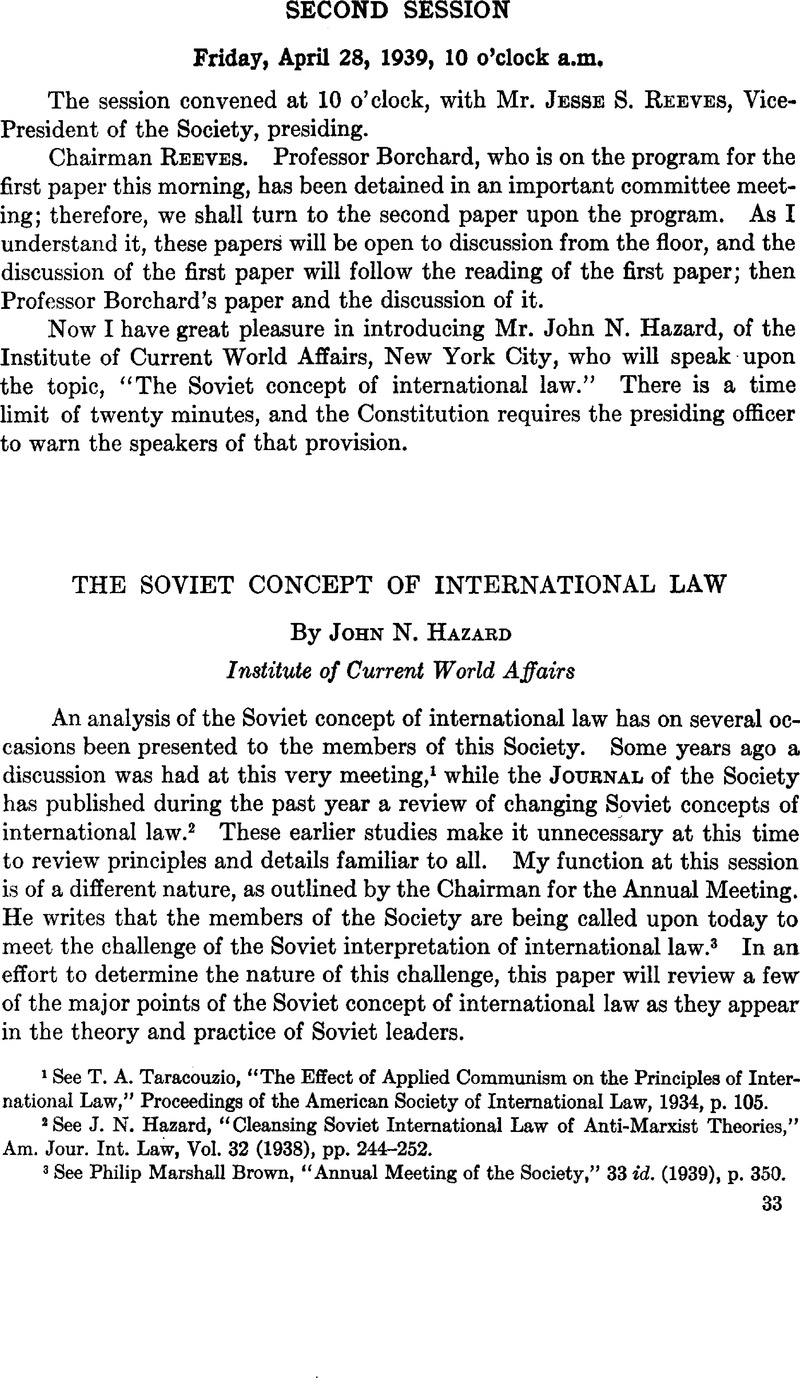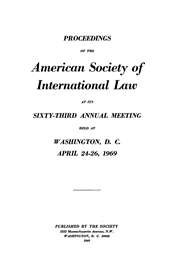No CrossRef data available.
Article contents
The Soviet Concept of International Law
Published online by Cambridge University Press: 27 February 2017
Abstract

- Type
- Second Session
- Information
- Copyright
- Copyright © American Society of International Law 1939
References
1 See Taracouzio, T. A., “The Effect of Applied Communism on the Principles of International Law,” Proceedings of the American Society of International Law, 1934, p. 105 Google Scholar.
2 See Hazard, J. N., “Cleansing Soviet International Law of Anti-Marxist Theories,” Am. Jour. Int. Law, Vol. 32 (1938), pp. 244–252 CrossRefGoogle Scholar.
3 See Philip Marshall Brown, “Annual Meeting of the Society,” 33 id. (1939), p. 350.
4 See Antonov, K., “K Voprosu o Mezhdunarodnom Prave” [On the Question of International Law], Sovteskoe Oosudarstvo (1938), No. 4, p. 62 Google Scholar.
5 See Programma po Mezhdunarodnomu Publichnomu i Chastnomu Pravu dlya Yuridicheskikh Vuzov (Moskva, 1938), p. 4 [Program for International Public and Private Law for Juridical Higher Schools].
6 See quotation accredited to Lenin, , “There is no more erroneous nor harmful idea than the separation of foreign and internal policy.” Lenimkii Sbornik (Moskva, 1935), Vol. 21, p. 66 Google Scholar.
7 See Stalin, J., Speech to 18th Party Congress, March 10, 1939 Google Scholar. For English translation of text, see 9 Moscow News, No. 11a, March 16, 1939.
8 “To what then are we to attribute the systematic concessions made by these [the non-aggressive states] to the aggressors? It might be attributed, for example, to the fear that a revolution might break out if the non-aggressive states were to go to war and the war were to assume a world-wide character.” See J. Stalin, id.
9 See Litvinov, M., “Czechoslovakia and the World Crisis,” speech before the Assembly of the League of Nations, Sept. 21, 1938 (Internat. Publishers, N. Y. 1938), p. 6 Google Scholar.
10 See M. Litvinov, id.
11 See Litvinov, M., declaration to representatives of the French press, July 7, 1933, in Litvinov, M., Vneshnyaya Politika S.S.S.R. (Moskva, 1935), p. 256 [The Foreign Policy of the U.S.S.R.]Google Scholar.
12 See M. Litvinov, op. cit., supra, note 9.
13 See M. Litvinov, speech on the Herriot Plan and the Determination of the Attacking Party, Feb. 6, 1933, op. cit., supra, note 11, at p. 302.
14 For collection of these treaties, see Traités de neutralité, de non-agression et de procédure de conciliation entre I’Union des R.S.S. et les états étrangers (Commissariat du peuple pour les affaires étrangères, Moscou, 1934). The treaty with China, dated Aug. 21,1937, is too recent for inclusion. For text, see Izvestiya, No. 203 (6365) of Aug. 30, 1937. See also English texts of these treaties in Am. Jour. Int. Law, Supp., Vol. 27 (1933), pp. 167-195.
15 See M. Litvinov, op. cit., supra, note 9.
16 See M. Litvinov, statement to representatives of TASS in Geneva on the Franco-Soviet Agreement, Dec. 5, 1934, op. cit., supra, note 11, at p. 273.
17 For text of Soviet-French Treaty, see Sobr. Zak., S.S.S.R., 1936, II, No. 7, Art. 72; also Am. Jour. Int. Law, Supp., Vol. 30 (1936), p. 177. For text of Soviet-Czech Treaty, see id., 1935, II, No. 14-15, Art. 130. For text of Soviet-Mongolian Treaty, see id., 1936, II, No. 23, Art. 213.
18 Signed at London, July 3, 1933. This and an accompanying convention have been adhered to by Poland, Rumania, Afghanistan, Iran, Estonia, Latvia, Finland, Turkey, Czechoslovakia, Yugoslavia, and the U.S.S.R. For text with dates of adherence, see Sbornik Deistv. Dog., Vypusk VIII, pp. 27-34. For English texts, see Am. Jour. Int. Law, Supp., Vol. 27 (1933), pp. 192, 194, 195.
19 See M. Litvinov, op. cit., supra, note 9; also more recently the speech of J. Stalin, cit., supra, note 7.
20 For review of Soviet policy and activity in relation to disarmament, see Korovine, E. A., “The U.S.S.R. and Disarmament,” International Conciliation, No. 292 (1933), pp. 291–308 Google Scholar. Supplements include drafts presented by the Soviet delegation to the Disarmament Conference.
21 See Protocol of Aug. 27, 1928, signed by Estonia, Latvia, Poland, Rumania, and the U.S.S.R. Turkey adhered on April 1, 1929. For text, see Sbornik Deistv. Dog., Vypusk V, p. 8.
22 “Let us take for example the question of revision of treaties. It would seem that this question does not concern us, since we did not take part in the treaties concerned—not even morally. We have not approved of them. More than that, we have not concealed our sympathy for those peoples in respect to whom these treaties created class injustices, and therefore we do not object to revision of these treaties, but, of course, only in case this revision can take place in a peaceful way, on the basis of voluntary agreement, or if in removing existing injustices it [revision] does not create other and perhaps still greater injustices.” See M. Litvinov, Speech at Fourth Session of Central Executive Committee of the U.S.S.R., Dec. 29, 1933, op. cit., supra, note 11, p. 54 at 60.
23 In carrying out this policy, the Soviet Union supported Turkey in her effort to gain the consent of the interested Powers to refortification of the Straits, an effort which was crowned with success at the Montreux Conference in 1936. For estimate of the effect of this method of revision, see leading article, Izvestiya, No. 168 (6025), July 21, 1936.
24 See M. Litvinov, Declaration, cit., supra, note 11.
25 For Soviet estimate of the meaning of this conference, see leading article, Izvestiya, No. 214 (6376), Sept. 12, 1937, p. 1.
26 See id.
27 See press report in New York Herald Tribune, Oct. 30, 1937.
28 See Civil Code, R.S.F.S.R., Art. 8 of the Introduction (Code of 1922).
29 For example, see Treaty with Persia, Feb. 26, 1921. Sbornik Deistv. Dog., Vypusk I-II (reprint of 1935), p. 36.
30 Decree of June 4, 1918. Sobr. Uzak., R.S.F.S.B., 1918, No. 39, Art. 505.
31 See Litvinov, M., Statement at The Hague on July 12, 1922, quoted in Taracouzio, T. A., The Soviet Union and International Law (N. Y. 1935), p. 296 Google Scholar.
32 For Soviet comments on this incident, see Journal de Moscou, 7 Janvier, 1936, p. 1.
33 See Statute on the People’s Commissariat for Foreign Trade, dated Sept. 13, 1933, Sobr. Zak. S.S.S.R., 1933,1, No. 59, Art. 354. Such representatives existed in the following countries in September, 1938—England, France, Belgium, Spain, Germany, Italy, Sweden, Norway, Denmark, Czechoslovakia, Poland, Estonia, Latvia, Lithunia, Finland, Greece, Turkey, Iran, Mongolian People’s Republic, Touva People’s Republic, and Japan. Trading agencies existed in Western China (Sinkiang) and Rumania. See list arranged in this order in Vneshnyaya Torgovlya Sovetskogo Soyuza (Nauchno-Issledovateskii Inslitul Monopolii Vneshnei Torgovli [The Foreign Trade of the Soviet Union], p. 83.
34 For citations to these numerous treaties, see lists in Appendix XXIV of T. A. Taracouzio, op. cit., supra, note 31.
35 See Proceedings of the American Society of International Law, 1934, p. 195.
36 See J. Stalin’s statement as to the guiding principles of Soviet foreign policy in speech, cit., supra, note 7.




